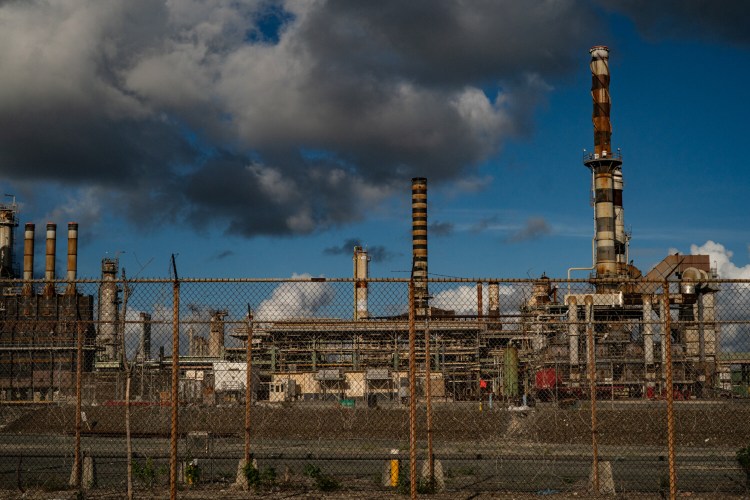The controversial St. Croix oil refinery that showered pollution on local residents said Monday that “extreme financial constraints” will force it to remain shut indefinitely, leaving the island at a crossroads.
While many residents welcomed the prospect that the U.S. Virgin Islands might shift away from fossil fuels, which has powered its economy for half-a-century, the refinery’s rapid economic collapse raises uncomfortable questions over how the island will move forward. Hundreds of people have reported falling ill or having their homes and drinking water wells covered in oil since Limetree Bay Refining started operations in February, while many others now find themselves out of work.
After decades of government indifference, officials at the highest level of the U.S. government identified Limetree Bay as evidence that Americans of color were paying too high a price in exchange for meeting the nation’s energy needs. But neither the Biden administration nor local officials have yet to identify a different path forward.
The refinery – which received a greenlight to restart from the Trump administration – came under intense scrutiny after a plant mishap rained a fine mist of oil over homes more than three miles away, just three days after it resumed operations. A series of other accidents happened in quick succession, prompting the Environmental Protection Agency to temporarily shut it down last month on the grounds that it posed an “imminent” public health threat.
Monday’s announcement suggests that the refinery, which now owes tens of millions of dollars to contractors and faces multiple class-action lawsuits from residents, might never restart. The company, which will continue to operate an adjoining oil export terminal, says it will lay off 271 employees by Sept. 19. Earlier this year the company said the two operations combined employed 400 full-time workers and 300 contractors combined. On Friday the majority of remaining contractors were sent home.
“This was an extremely difficult decision for us, and we are truly saddened to announce suspension of our restart plans for the refinery,” said Jeff Rinker, Limetree Bay’s CEO, in a statement. “Unfortunately, this is our only option, given the extreme financial constraints facing the company.”
Virgin Islands Good Food Coalition Executive Director Sommer Sibilly-Brown, whose group just started conducting a survey of the refinery’s health and environmental impacts along with other nonprofits late last week, said in an email that she remains concerned about what it means for the people in her community – all of them. “The people who will be laid off, the people impacted by the incidents, and the people of St. Croix,” she added.
“We are a community of Black and brown people who have been historically burdened by the effects of the refinery and left with the aging facility, undocumented health impacts and no remediation to environmental impacts caused by refining.”
Officials from EPA Region 2 have been conducting an ongoing investigation of the plant, and set up a temporary air monitoring system after officials determined the refinery had emitted both hydrogen sulfide and sulfur dioxide, which are linked to respiratory disease, above levels allowed under federal law.
On Wednesday, EPA gave Limetree two weeks to come up with a plan to establish a more elaborate air monitoring system for pollutants,
Walter Mugdan, the acting administrator for EPA Region 2, said in a statement Monday that the agency “is and has been focused on the health and safety of the St. Croix community.”
“EPA has had regular, ongoing communications with Governor [Albert] Bryan’s office and the U.S. Virgin Islands government to offer our assistance to help this facility operate in a manner that is safe and complies with laws that protect public health,” he added. “These lines of communication remain open and EPA stands ready to assist as needed.”
BP, the main customer for the low-sulfur fuel processed at the refinery, declined to comment on the matter Monday.
Even as it remains unclear how a future cleanup would be handled, residents are continuing to come forward with complaints. The ongoing survey has already received nearly 400 responses from people on St. Croix detailing how they have struggled in the wake of several refinery accidents.
“The data we’re getting is overwhelming,” Bennington College Professor David Bond, who helped organize the effort, said in a phone interview. Bond, who is currently in St. Croix conducting outreach, said people are describing “impacts that often felt invisible.”
In some instances, he said, “There was a fog of chemicals invading people’s homes at night. … Children are falling out of bed, not being able to breathe.”
Advocates on the island argue that both the companies that have reaped profits from refining oil there since the 1960s, as well as the federal government, should support economic development efforts that do not involve fossil fuels.
“The people of St. Croix are owed a great debt accruing from the historical operations of petrochemical plants on our island,” said Frandelle Gerard, executive director of Crucian Heritage and Nature Tourism, who opposed the plant’s restart.
A month ago, the White House Environmental Justice Advisory Council recommended that the Biden administration consult with the community on St. Croix’s south shore, where the refinery and other industrial operations are located, on how “investments can best be made to address environmental injustice, including but not limited to groundwater, air quality, and coastal zone cleanup.”
Asked about these plans, the White House did not immediately respond to a request for comment.
Comments are not available on this story.
Send questions/comments to the editors.


